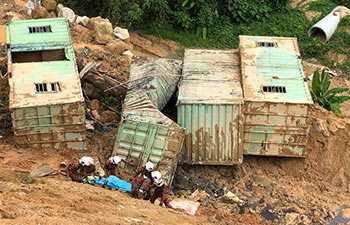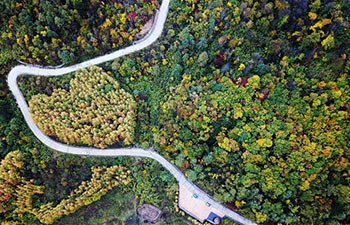by Philipp Requat, Anna Strumpel
BERLIN, Oct. 19 (Xinhua) -- Not too long ago, the most common criticism of Chancellor Angela Merkel made by her detractors was the seemingly unassailable grip on German politics which the Christian Democratic Union (CDU) leader had acquired.
Merkel started out as an underdog, defying several stereotypes of German federal leaders as a female chemistry PhD from the former Communist East, but has become a fixture at the helm of the country's government. An entire generation has grown up in Germany without knowing any other chancellor since Merkel first took office nearly 13 years ago.
More recently, many Germans are beginning to ponder life after Merkel. Seen as an almost invincible electoral force once, she is now attacked by politicians and journalists for failing to keep her own ministers in line and hanging on in office as a "lame duck" whose best days are behind her.
The transformation in the 64-year-old's image, from cunning political novice to a tired veteran stateswoman, is epitomized in media reactions to repeated clashes between Merkel and Interior Minister and Christian Social Union (CSU) leader Horst Seehofer. Threats by Seehofer in the summer to resign, and hence potentially provoke the unravelling of the ruling grand coalition were read as an unprecedented example of cabinet disobedience and a sign of the chancellor's eroding authority.
For many pundits, this impression was only reinforced by the government's handling of the so-called Maassen affair last month. Hans-Georg Maassen, provoked outrage as president of the Federal Office for the Protection of the Constitution (BfV) when he attempted to downplay televised scenes of far-right violence on the streets of Chemnitz. Seehofer refused to give in to pressure from Merkel and German Social Democrat (SPD) leader Andrea Nahles to sack the intelligence chief.
An unusual compromise was reached to remove Maassen as head of the BfV while promoting him to a better paid position as secretary of state in Seehofer's Interior Ministry. Although the German government backtracked again within a few days in the face of an angry popular backlash against its decision, the incident was depicted in media as underscoring just how little leverage Merkel enjoys in her fourth governing cabinet.
Another blow to Merkel was the surprising election of Ralph Brinkhaus as the leader of the CDU parliamentary faction over Merkel's preferred candidate Volker Kauder in early October.
Merkel has lost some of her "political instinct" with regards to her own party and the broader population since the 2015 refugee crisis, Juergen Falter, Senior Research Professor at the University of Mainz, told Xinhua in an interview.
"Merkel's loss of authority began with Seehofer's attacks against her asylum policies and continued with the Maassen affair and now the voting out of Volker Kauder as CDU/CSU parliamentary faction leader", Falter said. He added that the chancellor had consequently experienced "several successive defeats" and was no longer as successful in managing her party compared to previous years.
However, the German chancellor is unlikely to yield to pressure to surrender her post anytime soon. "Firstly, there would have to be a willing successor and at the moment there is no one who is willing to lead an open challenge. Secondly, the other parties would have to approve of the successor in question", Falter said.
Two weeks ago, an image of Merkel's characteristic suit jacket hanging from a coat rack, with the caption "What will come, when Merkel goes?", was on the front cover of the German magazine Spiegel. What is noteworthy about the cover is that it reflects a shift in tone. The question is now when and not whether the CDU leader would step down in a seemingly foregone conclusion about Merkel's retirement from Germany's political stage.
At least so far, Seehofer has not been rewarded for going head to head with Merkel. The CSU slumped to its worst ever electoral result in its Bavarian homestead as voters fled in droves to the Greens and AfD instead of following the traditional catch-all party in its lurch to the right. Given a parallel collapse in support for the SPD, some commentators have interpreted the outcome as a blow directed at the "grand coalition" as a whole. The CDU did not participate in the race itself, however, and gains enjoyed by the Greens on a pragmatic platform in Bavaria suggests that there is still some mileage in Merkel's centrist brand of politics.
David McAllister (CDU), former governor of Lower Saxony and the acting Chair of the European Parliament Foreign Affairs Committee, told Xinhua that the federal government should focus on delivering good policy rather than speculating prematurely about the chancellor's demise.
"As long as Angela Merkel is serving as chancellor there is no reason to ponder her successor. I am against having these debates at this moment." McAllister urged the "grand coalition" partners to instead direct their energy to ending the internal "quarreling" witnessed during past weeks."
McAllister further expressed confidence that Merkel's chancellorship would be remembered as a "very successful one", when it finally drew to a close. "She has made the German economy strong, we have a balanced federal budget and the lowest youth unemployment in Europe. We have rarely had such a long favorable economic period in Germany", the senior CDU politician said. In the 13th year of her chancellorship, it seems, the rhetorical battle for Merkel's legacy has begun.
Measured by most conventional standards, it's hard to disagree with McAllister that Merkel's chancellorship has been a success. Aside from the feat of emerging victorious in four successive federal elections, the domestic economy has grown continuously and rapidly for past seven years with below average unemployment and inequality compared to other industrialized nations. Contrary to fears that the 2015 influx of asylum seekers would lead to an unravelling of Germany's socio-economic fabric, crime is down and public budget surpluses are at record levels.
Yet at the same time, cabinet infighting and rise of far-right Alternative for Germany (AfD), most recently in Bavaria, showcase that this benign narrative of Merkel's reign is not uncontested. The AfD, and even Interior Minister Seehofer, clearly have a radically different view of Germany's national trajectory.
The latest "Populism Barometer" by the Bertelsmann Foundation warns that voter fatigue with centrist views is growing in the Eurozone's largest economy. In 2018, 30.4 percent of voters in Germany were allocated to the populist spectrum of electoral politics by researchers at the Guetersloh-based think-tank. During the same period, the share of voters who had "clearly non-populist" views declined by 4.1 percentage points to 32.8 percent.
The Populism Barometer findings underscore that debate over Merkel's future is not just about a personnel and legislative reshuffle in the highest echelon of power in Berlin. A broader shift in Germany's political culture is underway, the final outcome of which remains unclear.
As a consequence, the legacy of the chancellor is likely to be determined as much by the ideology of her successor to power as by the favorable labor market and GDP data of her governments. If Merkel cannot pass her final test of building up a CDU leader and chancellor who defends her own moderate course, the damage to her historical reputation could be lasting.













